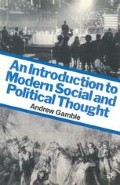Abstract
Revolution, like so many words in the political vocabulary, has undergone a major change of meaning in the last two hundred years. For Greek and Roman thinkers, revolution meant a political change in which one form of government, one set of rulers, succeeded another in a predetermined sequence. Political life was conceived as a wheel of fortune which as it revolved brought authority and rule to some, and ruin to others. These changes were thought to be as inevitable, as fixed, and as unalterable as the positions and movements of the heavenly bodies were conceived to be by the astronomers.
Preview
Unable to display preview. Download preview PDF.
Copyright information
© 1981 Andrew Gamble
About this chapter
Cite this chapter
Gamble, A. (1981). The state and civil society. In: An Introduction to Modern Social and Political Thought. Palgrave, London. https://doi.org/10.1007/978-1-349-16615-2_2
Download citation
DOI: https://doi.org/10.1007/978-1-349-16615-2_2
Publisher Name: Palgrave, London
Print ISBN: 978-0-333-27029-5
Online ISBN: 978-1-349-16615-2
eBook Packages: Palgrave Political & Intern. Studies CollectionPolitical Science and International Studies (R0)

